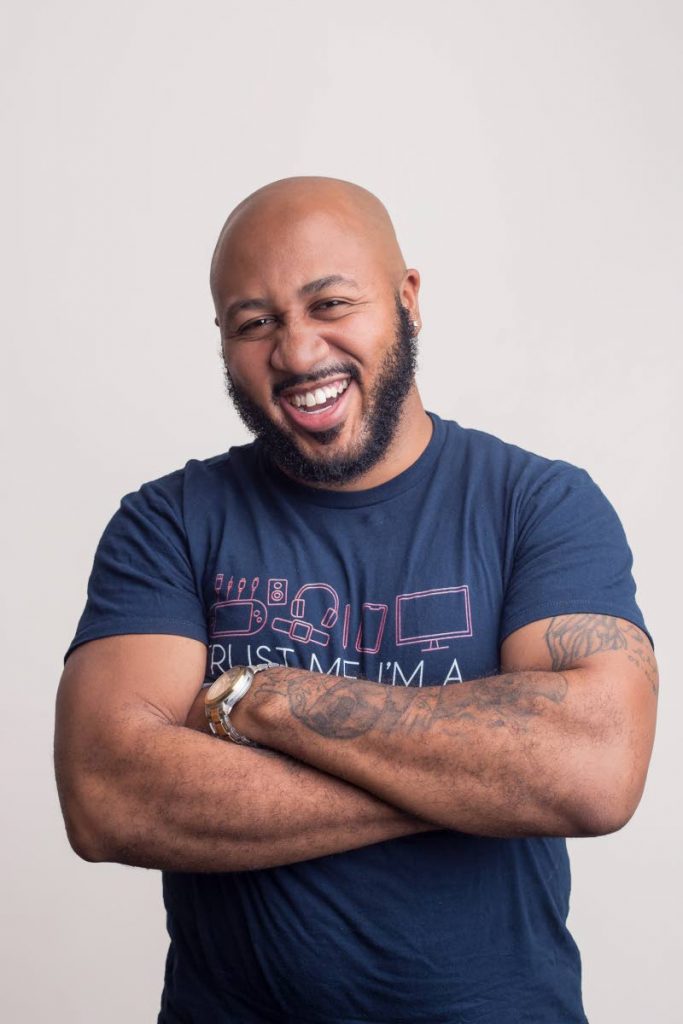Metaverse, way forward for Caribbean start-ups

Technology is evolving every day and there are Caribbean people paying attention and taking advantage of these advancements and reaping the rewards. The question is becoming less of, “Does the Caribbean want to be left behind?” but rather – “Are you willing to be left behind?”
Business Day spoke with digital business strategist and podcast host presenter Keron Rose and co-founder, director of Tech Beach and ChefMade Kyle Maloney, who both believe technology can slow and ultimately bring a halt to the brain drain which has been siphoning the region’s brightest and most talented to the economic north for decades.
Latest technology becoming mainstream
Rose believes TT must catch up with technology advancements to benefit from the rapidly evolving tech landscape. He said Facebook, now Meta, with its intended changes, will be an ideal platform and opportunity for more people to familiarise themselves with the latest facilities available in the tech space.
"It opens up a world of opportunity and now that it is mainstream, people won't have to leave paradise to work remotely, even for companies based abroad, and earn a living. This can be huge for TT and the entire region."
He warned unless creative professionals in TT start understanding and increasing interaction with new ways of monetising their original work, they will be left behind.

Facebook CEO Mark Zuckerberg announced the company's name change to Meta at the Facebook Connect augmented and virtual reality conference on October 28, saying, "We are a company that builds technology to connect. Together, we can finally put people at the centre of our technology...to reflect who we are and what we hope to build."
While the name of the social media app will remain, the company, as Meta, moves toward further redefinition and rebranding.
Zuckerberg said the name Facebook can no longer fully encompass everything the company does now, and hopes over time it will be seen as a "metaverse."
"The metaverse is the next frontier, just like social networking was when we got started," Zuckerberg said.
Metaverse is defined as a digital space that combines elements of virtual reality, augmented reality, social media and the use of digital currency, which allows for a more immersive experience of technology.
Meta's stock went up by more than three per cent on the same day.
Rose said, "The biggest part of what Facebook will now be doing is that they will help in making virtual reality, augmented reality, NFTs and cryptocurrency more mainstream."
Virtual reality (VR) is a digital simulation that creates an experience similar to or different from the real world, such as video games or digital programmes used for medical or military training. Augmented reality (AR), on the other hand, is an enhanced digital simulation of the physical world, but incorporates other perceptual information such as visual, audio, haptic (touch sense) and even smell. Augmented reality seamlessly merges the real world with interactive, real-time 3D digital overlays.
NFTs are non-fungible tokens, which means each is unique and the original cannot be replaced, like a one-of-a-kind work of art. NFTs can be any piece of original work made digitally, such as drawings and music, which is sold with digital currency. While the original piece will always be just that – original – copies of the work can be made, but only one person can own the original, and the artist will benefit from the replication of the work through copyright and reproduction rights.
Tech website theverge.com highlighted a piece of digital art by artist Beeple that resold for US$6.6 million after first selling for US$66,666.66. In March, another NFT of his work sold for a record-breaking US$69 million
.
'TT can make better use of tech'
"There is a lot of stagnation when it comes to the use of technology in TT. Even the things people can do, they aren't doing," said Rose.
Online facilities like e-commerce, where websites can be set up for online business transactions, he said, are underutilised.
"Now we can sell to anyone in the country, at least, easily, but we still have people asking why they need a website if there are already platforms like Facebook, while e-commerce is heavily used in other Caribbean countries like Jamaica.
"We always talk about what is happening in other countries, but our institutions are not helping with education, except Flow Business, that is contributing to education through their workshops.
"Meta, as a company, has declared that they have grown beyond Facebook. These products will be available within Facebook, but the perception and idea of what technology can do will change."
He said local artists can benefit greatly from these technological advancements being made available on a mainstream app like Facebook.
"This change will help us to not have to think about migrating for opportunities to sell art. People can now build their digital presence using social media and websites, release music and art as NFTs and protect intellectual property. And where it gets even better is the fact that people can now facilitate receiving a commission. If the work is resold, more payments will be made each time."
Rose said the use of cryptocurrency will eradicate challenges with cross-border payments. These facilities will allow Caribbean-based people additional opportunities to work with people all over the world without having to leave the region for meetings.
"If you needed to work somewhere abroad and may be needed to physically see or inspect a venue, this will now be much more realistic than an inspection on a 2D screen, because the confines of what is generally available do not do these experiences justice. AR and VR will allow us to be part of these things in a different way without feeling like one has to migrate to participate."
Rose said he hopes to see TT get on board with the changing tech landscape regarding how culture is packaged, for increased domestic income.
"If culture as immersive experiences can be well-packaged and sold to people across the globe, rather than trying to film Carnival for sale, more people will be inspired to come to experience it in real life – virtual tourism. If people can experience a space or an event virtually, they are more likely to save up their money for it."
Asked what he hopes to see happen soon for TT and tech, Rose said a change in mindset.
"Until the mindset shift happens, people will keep thinking they need to migrate for opportunities outside TT, and the brain drain will only continue.
"I want people to start seeing technology as an enabler and see how we can use it to participate in the global economy. I hope people will start exploring their curiosity to find out what can be done with technology – and the skills needed do not have to come through a formal educational institute: just explore from Google."
Caribbean tech start-ups earning millions
As an example of this potential, Tech Beach launched a tech accelerator programme, which is focused on helping some of the most promising tech companies in the region grow.
Maloney said the programme is equipped with a number of important pieces – education, mentorship and strategic access to capital support.

The programme is for those who are by no means novices.
“They know how to move. We’re talking about companies that have been making great progress in their own right. Coming in, these companies would have already raised money. The total money raised by these companies totalled US$25 million. In the last four months we helped them raise an additional five.”
Maloney said the value added by Tech Beach is in getting these companies to become leaders in their individual spaces. These companies include those in fintech, where technology facilitates and supports banking and financial services such as WiPay and Squeeze Cash from St Lucia.
There are also companies involved in telemedicine, which remotely provide diagnostic and treatment services for patients via telecommunications technologies.
“There’s a company called MdLink in Jamaica founded by Che Bowen. There is a company out of the Dominican Republic building a digital bank. We are covering a lot of ground in terms of quality companies and companies from 13 countries across the region, along with a few from the US and UK.”
Maloney told Business Day there has been an acceleration of companies becoming hybrid since the spread of the covid19 pandemic.
“Some companies are pushing to be predominantly remote. The company Automattic, which owns Wordpress and Tumblr, has as many as 1,600 fully-remote employees.
"At senior levels they have people from the Caribbean. Their global head of revenue is Cavel Khan from Jamaica. They more recently hired three Jamaican talents within the last two years and those opportunities came through those people seeking ways to prepare themselves with what’s available to them.”
Maloney said based on the talent discovered by the company, it has created a pipeline for talent coming from the region.
“These guys are now being paid US currency while living in Jamaica.”
Asked how prepared he thinks the majority of the Caribbean population is to take advantage of the opportunities available through technology, he said, “We are not even close.
“Bear in mind, a lot of these advancements, like NFTs, are new. In the global scale of how we adopt technology in the region, we are somewhere between middle and laagered. And so the expectation for most people to know the ins and outs of these things that are still new is low.”
He said within the region there will always be people who are trying to stay ahead of what is happening, but they are frustrated by the lack of progress in innovation that permeates the region.
Asked what kinds of opportunities are available to those seeking training in the tech space in fields from coding, digital marketing and managing digital currency, he said, “People would be positioning themselves for the opportunities of tomorrow that are yet to open themselves.”

He said people who prepare themselves with the education necessary to join the tech revolution will have positioned themselves to win in ways they may not be able to calculate at this point.
“The opportunities will begin to unfold in very significant, tangible ways that will create levels of financial freedom for themselves and family that are immeasurable compared to what would, unfortunately, be available in the local climate.”
Maloney said, inevitably, local companies will find difficulties as tech companies continue to fortify pipelines for global opportunities.
“They will now have to compete with these global players for talent. When more Caribbean people have the opportunity to work on global projects, earning globally competitive salaries and benefits, the local companies will find it challenging to compete.”
He said this will force companies to evolve into more digital structures, while understanding how to tap into the global talent pipeline, of which they are currently not aware.
For those seeking opportunities in the tech space, Maloney said there are many courses available online, since the decentralisation and democratisation of education is a massive revolution.
“The power universities once held is now becoming significantly decentralised. For many industries they are becoming almost irrelevant, because (of) much of what students need to learn. There are select instances where universities will hold almost absolute power, but for a vast majority of degree programmes, they will become irrelevant when it comes to industries like digital marketing.”
He said many platforms such as Facebook offer free courses, while other programmes available on online training facilities like Coursera and some offered by Google are ideal for those seeking competitive qualifications.
After completing such courses, people will then be equipped to go out and offer their services, backed by these internationally recognised qualification.
“Once someone gets one client and learns from that experience, they’d be setting themselves up for further growth. And that goes for almost anything within the technology space. This is why companies like Google have removed their degree requirements for those seeking employment.”
Maloney said Tech Beach will continue to help in the region's digital revolution through its events, which reach a wide audience.
Another pillar of Tech Beach is TBR Lab, which is the education pillar, which focuses on start-ups, corporate and government.
“We have programmes for corporate entities with global leaders in their industry, to which they may not have easy access. And we do the same for government.
"Engaging with these organisations, the opportunity for the global recruiting pipeline came up. We are now going to begin playing a conduit between the global tech player, helping them expand their diversity of talent through the regional pipeline.”
Tech Beach is set to announce the next pillar, which includes investment in companies that go through their programmes.
“We want to begin investing in companies that are promising and seeking to solve meaningful problems in the region. We want to help accelerate their growth.”
Maloney believes these endeavours can contribute to a vision of the region being significantly different in the next five years.
“When people land anywhere in the region, they should be able to get a taxi, book a hotel, make restaurant reservations – the whole experience can be made digital. We want to help enable some of the best players in the region to help solve many of our problems, and do them well.”
Asked what kinds of businesses are likely to emerge in the next few years, he said, “We are already seeing health and telemed, fintech, which includes lending, money transfers, digital currency, digital assets, transportation of people, cargo and food, and security.
“There are already people working on an alternative to Netflix here in the Caribbean. There is a company in Guyana working on artificial intelligence and things like facial recognition. There are also emerging fashion, beauty and cosmetic companies that are set to take on the globe through technology.”
Maloney is one of the three finalists for the Entrepreneurship Award at TT Chamber's Champions of Business Awards – an award sponsored by TT Unit Trust. The ceremony will be held on November 19.


Comments
"Metaverse, way forward for Caribbean start-ups"